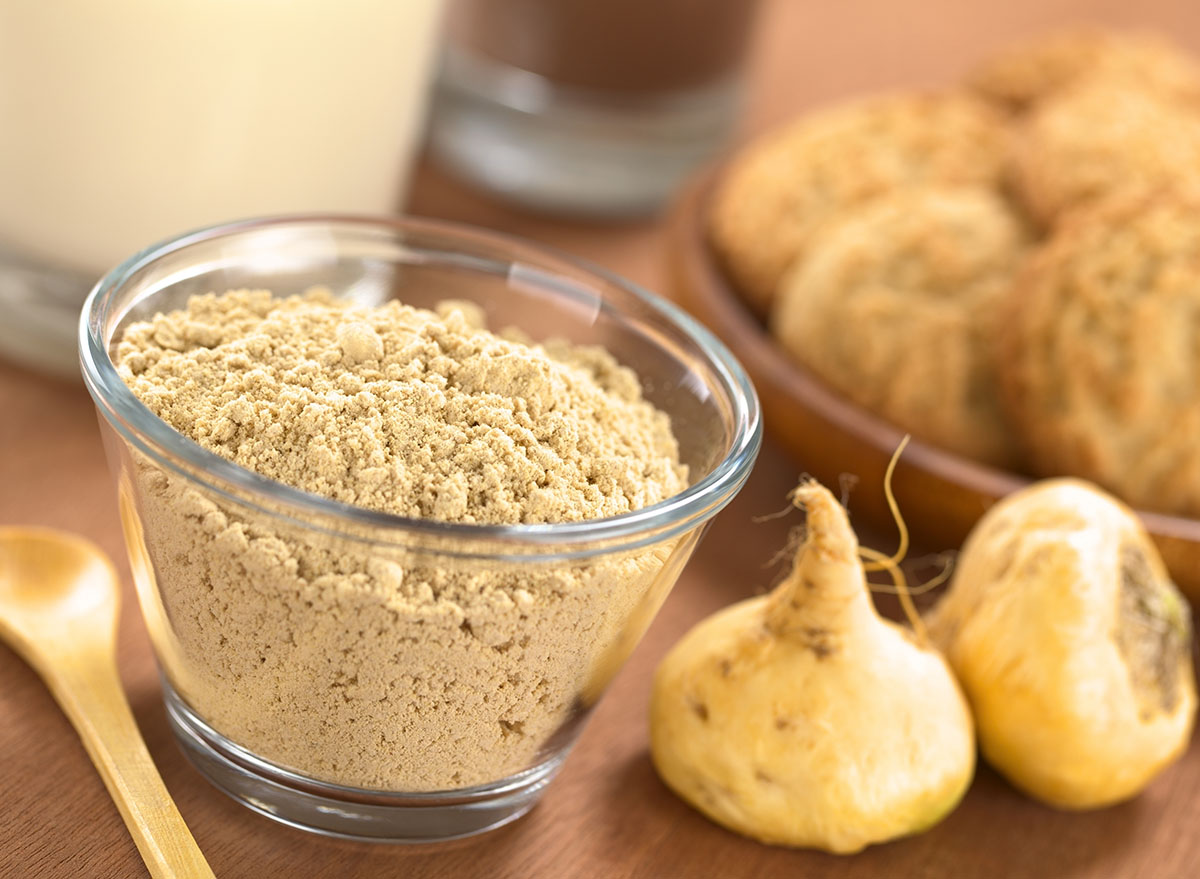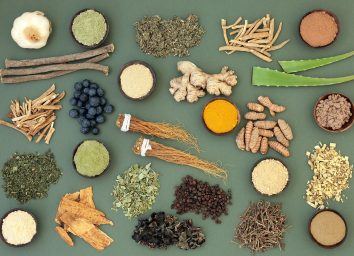What Is Maca Root, and What Are Its Health Benefits?

Adaptogens have been hogging the wellness spotlight since 2017, when influencers started posting (heavily edited) photos of colorful anxiety-reducing potions and energy-boosting powders on social media. And while it’s true that you shouldn’t believe everything you read or see on the internet, the benefits of adaptogens and superfoods might be one of the (rare) exceptions to that rule. You’re probably already familiar with some of the most popular herbal supplements, like ashwagandha (the stress-buster), and matcha (the Insta-worthy latte that yields energy and sharp focus without the jitters), but if there’s one adaptogen worth taking a closer look at, it’s maca root.
Lepidium meyenii or Peruvian ginseng, aka maca, is a plant native to the Andes Mountains of Peru. It is cultivated at altitudes as high as 8,000 to 14,500 feet and sprouts off-white flowers. Maca root is a tuberous root, meaning it is the oversized organ that stores the nutrients of the maca plant. Maca root is what is typically ground up and used as an adaptogenic herb and dietary supplement.
What are the health benefits of maca root?
If you were to look at a nutritional label for maca root, you’d see that the superfood is mostly made up of carbohydrates (about 75 percent), some protein, and very little fat. It contains essential minerals like copper, iron, and manganese, as well as vitamin B1, Romina Barritta, DTR, a dietitian based in Buenos Aires, Argentina, and board member of International Affiliate of the Academy of Nutrition and Dietetics (IAAND) told Food & Nutrition. Maca is also said to yield a range of health benefits from boosting libido and improving fertility, to enhancing your endurance, though more research is still needed on the subject.
Maca root may help alleviate sexual dysfunction in both men and women
Though research on the subject is limited, there are a handful of studies that suggest maca root can act as a kind of aphrodisiac for both men and women looking for a boost in the bedroom.
For example, during a 2002 study published in Andrologia, the first international journal of andrology, men between the ages of 21 and 56 years old instructed to take maca in doses of either 1,500 milligrams to 3,000 milligrams were found to have an increase in sexual desire after eight to 12 weeks of regular supplementation. A 2009 study published in the same journal discovered that maca root could also aid mild cases of erectile dysfunction over time.
Likewise, according to research published in the journal Menopause, postmenopausal women experiencing symptoms of sexual dysfunction might also benefit from maca root. While the study was preliminary, and focused on a small group of only 14 participants, the results showed that, over time, regular consumption of maca root reduced feelings of anxiety and depression, and conversely, increased libido. In addition, during a double-blind, placebo-controlled trial published in the journal Evidence-Based Complementary and Alternative Medicine, it was found that maca increased libido in women suffering antidepressant-induced sexual dysfunction.
Maca root has been found to improve fertility in men
For men trying to and having difficulty conceiving, research points to maca root as a natural fertility enhancer. Though experts note the need for more research on the subject, a 2016 systematic review analyzing five studies on the effects of maca on semen quality found that the ancient superfood was, in fact, found to increase sperm count and mobility in adult men.
Maca root might reduce hormonal symptoms of PMS and menopause
Whether you’re dealing with PMS every month, or are on the verge or in the middle of menopause, your body might be experiencing a range of hormonally-induced symptoms from mood swings and hot flashes to night sweats. Maca root might be able to help as it’s said to balance the female sex hormones.
Maca root might boost your overall mood and mental health
In a 2015 preliminary study performed by researchers in Australia, 29 postmenopausal women from Hong Kong blindly received either 3.3 grams of maca per day for six weeks, following a placebo pill for another six weeks, or vice-versa. After 12 weeks, although maca did not alter the women’s hormones, it did appear to reduce their blood pressure and symptoms of depression.
However, it is important to note that maca should not replace any medications taken to treat depression. If you are interested in the effects of maca on mental health, speak with your doctor to find out if the supplement is right for you.
Maca root might serve as an awesome pre-workout boost
Pre-workout powders, supplements, and even caffeine might get you hype and in the zone for a gym sesh, but they often come with jitters. Dr. Will Cole, leading functional medicine expert, IFMCP, DC, and author of The Inflammation Spectrum and Ketotarian, says that because maca yields natural energy-enhancing abilities, “it is a popular choice among athletes.” It has been shown in studies “to help increase endurance,” he says, adding that the adaptogen is also “helpful for avoiding fatigue.”
Are there side effects to taking maca root?
Dr. Cole says that maca root is safe for almost everyone. However, if you are pregnant or have impaired thyroid function, it could potentially interfere with the thyroid, so he highly recommends speaking with your healthcare provider before introducing the supplement into your diet. This could be because an abundance of cruciferous vegetables (maca is considered a cruciferous vegetable) has been found to cause hyperthyroidism (when your body produces too much thyroxine hormones).
Additional side effects might include jitters and difficulty falling asleep from over-stimulation, unintentional weight loss as maca is a natural energy booster, and, especially in active adults, can help speed up the metabolism. There is limited research to suggest that maca causes weight gain on its own, but it can lead to an increase in muscle mass as a result of an enhanced workout regime.
How should you implement maca root into your diet?
Maca root comes in a few different forms, such as powders, capsules, and tinctures. Gaia Herbs brand director, Stacey Gillespie, says that anyone looking to try maca root should look for products containing Maca root powder, as it has likely gone through the process of gelatinization, which makes it easier to digest. “A powder delivery format may be preferable to consumers as the recommended starting dose of maca is one gram,” explains Gillespie. The alternative is to take multiple capsules at one time to reach that dosage, which can be challenging, she adds.
That being said, you should choose a format that will be most convenient for you and your lifestyle. To get started with a maca powder, try this Gaia Herbs Maca Powder, or if you prefer a ready-made maca elixir try REBBL’s Maca Mocha.
How to go about buying maca products?
In a word: carefully. The most important detail to keep in mind when looking to add a new herb or supplement into your diet is to check its sourcing—in other words, where does it come from? We already know maca is native to Peru, but according to Gillespie, the herb is now also being grown and exported from China, where the weather conditions for cultivation are not as ideal. “The climate in China does not provide the most conducive growing environment, so the bioactive compounds found in maca grown there may not be as potent as the ones in the wild-grown, indigenous herb from Peru,” she says. “Another concern is that maca and other herbs grown in China may also be exposed to more pollutants and contaminants found in the environment,” she adds.
Therefore, before you buy any product with maca in it, do you research. Find out the origin of the product, its integrity, and the potency of the ingredient before considering going through with your purchase.








